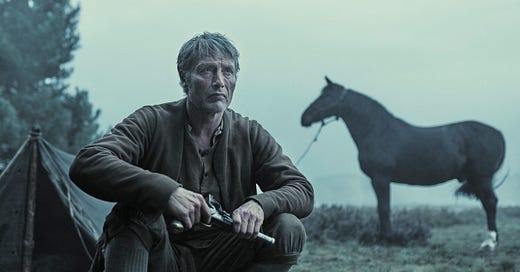The Promised Land
Mads Mikkelsen does grim better than just about anybody, though his stern Danish soldier/settler eventually lets his guard down in this outstanding historical(ish) drama.
Mads Mikkelsen’s face just does not seem naturally disposed toward smiling.
Something about the craggy contours and hard-staring eyes, along with that preternaturally stern Danish mien, has led to a long and fruitful career of mostly villainous or morally ambivalent roles.
Certainly he embraces the dour in “The Promised Land,” a drama set in the 1700s in the barren Jutland moorlands. The landscape is just as cold and bleak as the heart of Captain Ludvig Kahlen, a recently retired soldier from his majesty’s army. Left without prospects and nearly penniless except for a small pension, he appeals to the royal court to allow him to establish a settlement in the moorland and see if it can be cultivated.
Much hardship ensues, along with the maniacal opposition of the pampered local nobleman, Frederik de Schinkel (Simon Bennebjerg), who sees little use for the harsh scrubland abutting his estate until an upstart commoner comes in and makes something of it. Solemn standoffs in powdered wigs and courtly insults will soon give way to mayhem and bloodshed.
Kahlen endures this all with a stoic determination founded on 25 years of martial discipline. It would seem we’re set up for a very typical confrontation between two stubborn men who will not yield, the sort of thing we’ve seen many times before from “Braveheart” to “Rob Roy.”
But then the filmmakers — director Nikolaj Arcel (“The Girl with the Dragon Tattoo”) co-wrote the screenplay with Anders Thomas Jensen, based on a novel by Ida Jessen — make a very curious turn.
Owing to pressure from the contemptible magistrate, Kahlen has difficulty finding workers to help turn the moorland into hospitable soil. He’s forced to bring in gypsies illegally, who are soon run off, and he also relies on a married pair of indentured servants who escaped from de Schinkel’s cruel hand.
Events ensue such that only the woman, Ann Barbara ((Amanda Collin), remains at his squalid little settlement. She makes clear that she’s not there just to be Kahlen’s lowly servant, cooking his meals and cleaning his muddy boots, but demands a cut of the proceeds.
He eventually relents, and something like a partnership emerges, which mellows into a supportive friendship, and finally a romance. This is somewhat transactional at first — how else are they to survive the howling, frigid winter unless they share the same bed? — but it soon becomes clear Ann Barbara harbors genuine affection for him.
A couple of other figures complicate matters further, creating more cracks in Kahlen’s mercenary aspect.
Edel Helene (Kristine Kujath Thorp), de Schinkel’s betrothed and his cousin — hey, it was the 1700s — is smitten by Kahlen and sees him as a more favorable alternative to the unhinged nobleman. If Kahlen can obtain a title from the king within a year, her father will acquiesce to their marriage. Of course, this creates anxiety for Ann Barbara about her future disposition.
The other is Anmai Mus, a gypsy girl played by Melina Hagberg, who is also dark-skinned and thus seen as not just an undesirable but a demonic spirit who will bring bad luck. (Again, 1700s.) She’s a very smart and headstrong kid, and more or less wills Kahlen and Ann Barbara into accepting her as their surrogate daughter.
It’s heartwarming to watch Kahlen gradually melt in the presence of these three females. Mikkelsen’s performance is subtle and well-earned; there’s no sudden moment of emotional catharsis where he pours out his heart. His cagey captain is resolute in doing whatever is necessary to earn his commission, but bit by bit his soul turns toward the notion of hearth and home rather than a title and standing.
Bennebjerg is positively loathsome as de Schinkel, the epitome of privilege who has come to embrace chaos and amorality without having experienced any sort of existential hardship to justify them. We ache for his comeuppance… and oh, up it shall come.
It’s Collin, though, who occupies the movie’s emotional center as Ann Barbara. Living a half-step up from slavery, unwanted and powerless in a patriarchal society, she nonetheless has a courageous self-reliance that in many ways ennobles her above Kahlen and de Schinkel.
If one man thinks he was fated to have dignity and the other thinks it must be earned, Ann Barbara shows that each human is innately born with grace, and it is not something to be bartered.
“The Promised Land” is a gritty and inspiring story, though a fictional rather than historically accurate one. Kahlen was a real figure in Danish history, but a little Googling reveals him to be quite unlike the version in the film. Certainly he did not undertake a long and inexorable march toward empathy like the version portrayed by Mikkelsen.
An arid tale of masculine confrontation somehow morphs into a mushy romance — and I am all here for it.





